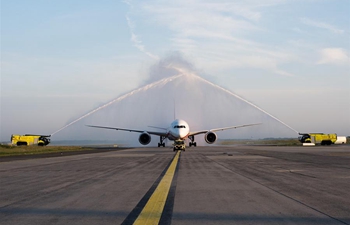GENEVA, July 11 (Xinhua) -- Two United Nations (UN) agency heads appealed on Thursday to the European Union and African Union to prevent a tragedy like the one last week in which more than 50 refugees and migrants lost their lives in an airstrike on a detention center near Tripoli in Libya.
The UN High Commissioner for Refugees, Filippo Grandi, and International Organization for Migration Director General Antonio Vitorino issued a joint statement, saying the approach to refugees and migrants in Libya must change after the July 3 attack on the Tajoura Detention Center.
"This week, we appealed to the European Union and the African Union to prevent such a tragedy from happening again.
"The international community should consider the protection of the human rights of migrants and refugees a core element of its engagement in Libya," said the statement.
"As a priority, we ask that 5,600 refugees and migrants currently held in centers across Libya be freed in an orderly manner and their protection guaranteed or evacuated to other countries from where accelerated resettlement is needed," said Grandi and Vitorino.
To achieve this, countries need to come up with more evacuation and resettlement places, they said.
Additionally, migrants wishing to return to their countries of origin should continue to be able to do so and to enable this, extra resources are essential.
"Detention of those disembarked in Libya after being rescued at sea has to stop," said the UN agency heads.
They believe that practical alternatives exist and people should be allowed to live in the community or in open centers and corresponding registration duties should be established.
They suggested that semi-open safe centers could be established, such as the UN Refugee Agency's Gathering and Departure Facility.
As of July 10, the Tajoura Detention Center is closed and some 400 attack survivors have been moved to the Gathering and Departure Facility in Tripoli.
"That center is now badly overcrowded, and work is ongoing to secure the evacuation of these people, particularly the most vulnerable, from Libya," said the statement.
However, it noted that many other refugees and migrants remain in detention elsewhere in Libya, "where suffering and risk of human rights abuses continue."
"For the approximately 50,000 registered refugees and asylum-seekers currently living elsewhere in Libya, as well as for the estimated 800,000 migrants, more help is required," Grandi and Vitorino noted.

















